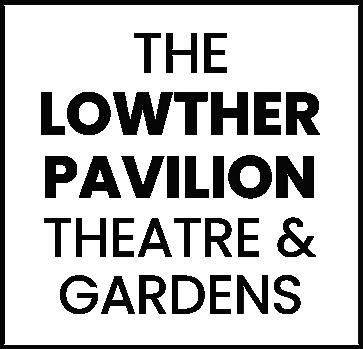
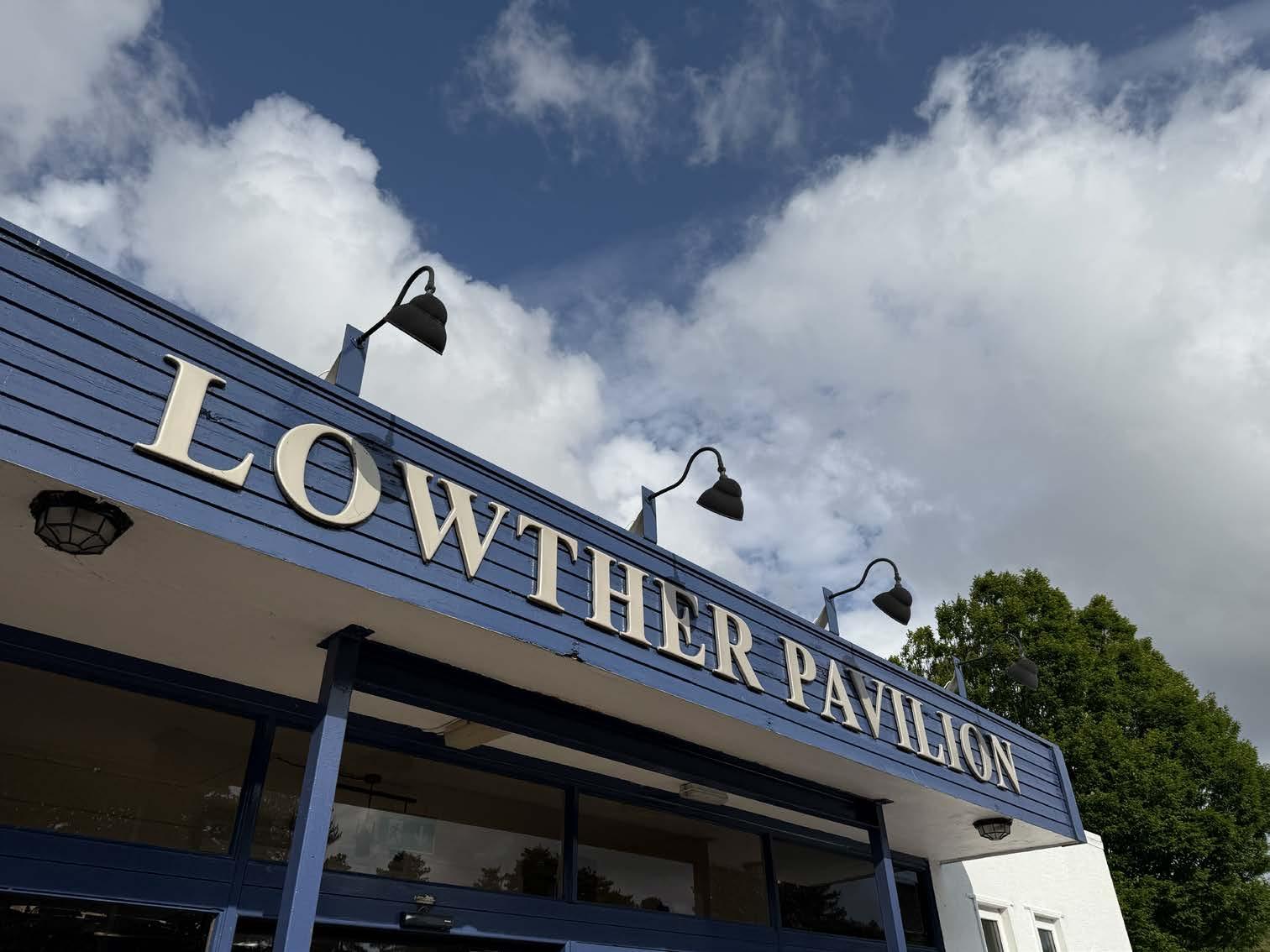



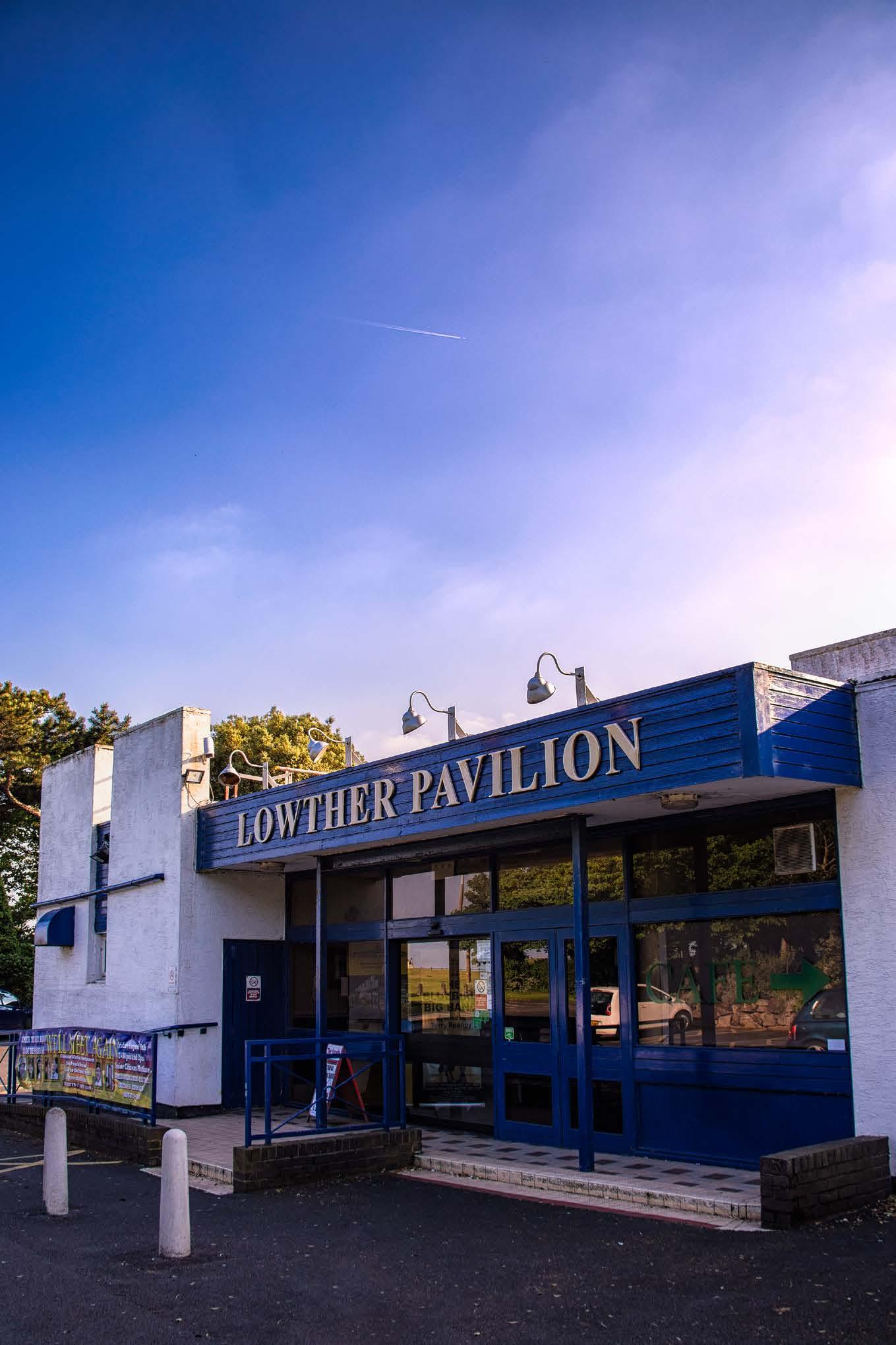
Thank you for taking time reading this booklet.
I decided to write a short forward to this booklet to give you a little bit of background information on Lowther and our commitment to working with the community who live in the Fylde region.
Built in 1921, our venue was built originally to provide shelter to a local orchestra who played regularly in the park. Fast forward to today and we continue to be a creative hub for Community Cultural activities balanced with some truly magnificent professional work.
Times may have changed and there is no doubt that our venue has had some difficult things to contend with, from its near destruction in the 1980’s to its loss making activities which in 2011 cost rate payers through Fylde Borough Council some £250,000 a year to run. It was obvious at this point that the future of the venue was uncertain and unless it could be turned around financially it would face the same fate as many other theatres and be permanently closed. The practice of handing keys over to local amateurs for two week periods was no
longer financially sustainable. There was no investment, no marketing, no box office facilities to speak of and a website that was just a single council page. Spring forward fourteen years and you have a fully staffed, well equipped two venue creative art space that is not only the pride of the Fylde coast but is also cutting a dashing swathe on the national scene with it young people’s community arts activities and its ground breaking technical training which is the envy of the industry. It has seen a growth in the number of sessions booked by local Community Cultural groups up to 184 in 2024/25 and supported new and emerging as well as long established societies.
We have strengthened our commitment to local community cultural activities and opened our second space, The Windmill Performance & Education Centre, which houses the 162-seat auditorium, The Chapman Studio.
The new venue is a home for choirs, brass bands, familiy acitivites, drama groups, youth theatre, and other community interest groups.
This booklet is provided to all local non-profit making Community Cultural Groups as a pathway through using the theatre’s facilities and a way of getting the best out of what is on offer. All staff and volunters are invested in the future of this building and we will work with you to achieve the best we can for your production.
I look forward to welcoming you to the theatre.
Tim Lince CEO/Artistic Director
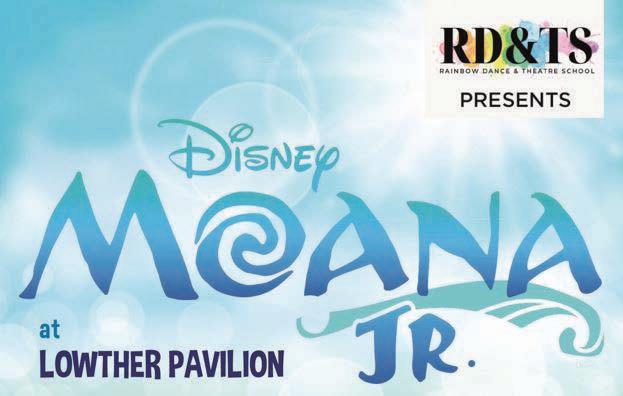
We now have two performance spaces available: The Main House (450 seats) and The Chapman Studio(162 seats). Both spaces boast the same size stage and full technical and cast facilities.
There are no cast guarantees that certain productions will sell. If it was that easy commercial producers would all be making money and there would be no risk involved. However, it is important to minimise that risk as much as possible.
Before picking your productions you must first understand your audience.
1. Who are they?
Friends, family and regular subscribers make up the audience of local productions. A large majority of the general public will not attend unless they know someone in the production or they have a previous interest in amateur cultural presentations.
2. Where do they come from?
For professional shows, 40% of our audience come from PR4 and FY8. The remainder come from further afield for specific events and high profile performances.
The split is 73.6% from PR4 and FY8 with local productions.
3. How do you let them know about your show?
Word of mouth is always the best way and in the past members of societies promoting their own tickets had a greater reach than any centrally run marketing. Good Artwork is essential and also having a society brand where regular visitors can see which group is performing.
4. Have your asked your audience what they would like to see?
Audience research is a useful tool to helping societies understand the needs and likes of their audience. Have you tried using an online form or running a poll on your social media channels to find out?
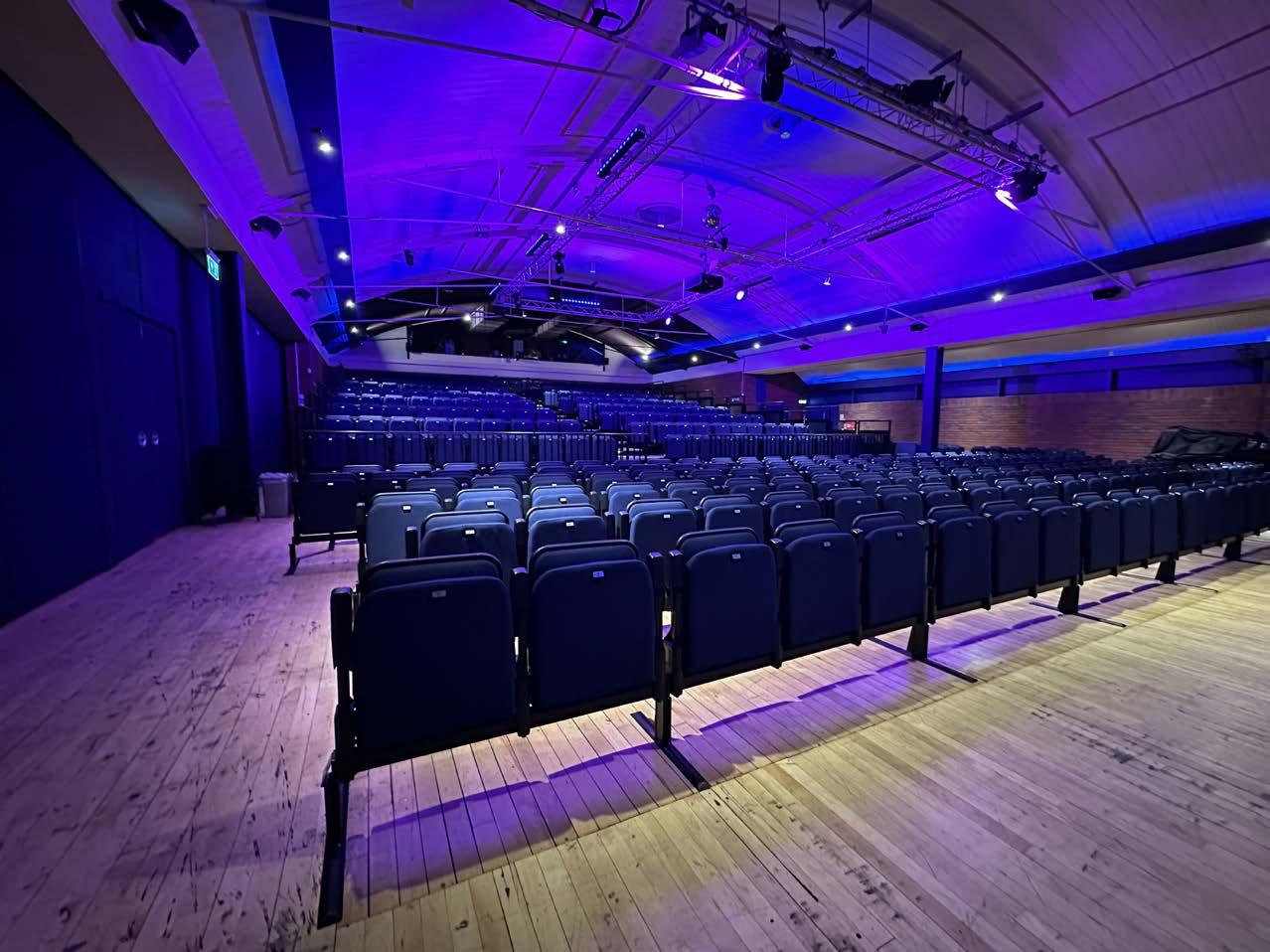
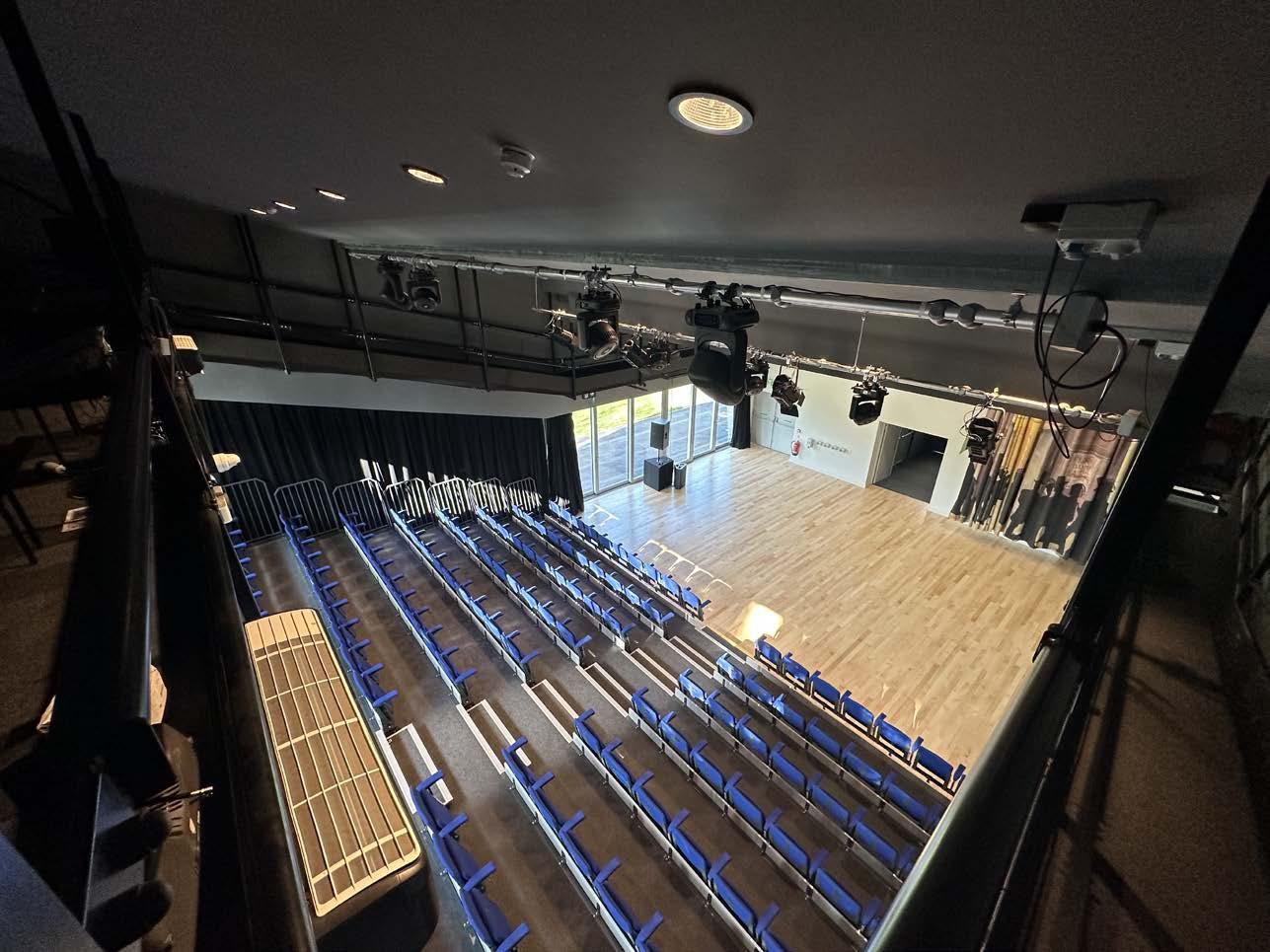
Over the last few years there has been a rush for people to perform the latest big show to be released for amateur performance.
But the things that are not often considered are:
> If a production is being released has it had a long professional tour prior to this release? If so, consider that people who have wanted to see this show have already seen it professionally.
> The cost of hiring in set and costumes for a just released production
> Do you have the talent in your local society to achieve your goals of staging this production?
> Are you creating a precedent that means you will have to seek out another first time performance next year?
> How is this production going to deliver long term growth objectives for your society? Does it allow talent development, the introduction of younger people to the society and stability with membership?
There are hundreds of years of interesting scripts available.
Consideration could be given to working with local new writers on productions.
We have been developing Lowther’s new writing offering and there are always new scripts that are being presented for consideration. We would be happy to support your work with new writers and scripts for development. It must be remembered that no script lands in it’s final form and it can be an interesting journey developing a script to stage.
Blood Brothers started its journey as a 4-man show touring to the community in Liverpool by MYPT before being developed into the musical it became. Research is key to getting a good script.
A. Which performance space will I use? The Main House or The Chapman Studio?
B. Cast Size
B. Age of performers required
C. Number of musicians required in pit (If in the Main House) (Please remember that most professional shows have a limited number of musicians in a pit and that scaled back musical productions are all the rage in smaller venues where intimacy can be obtained with smaller pit bands)
D. Technical requirements
Do you really need to hire 36 Radio Mics and all that extra lighting? We are a fully equipped theatre.
E. What are the set and costume requirements going to be?
F. How will you stage the Production?
G. What ticket prices can be charged?
H. What is the marketing budget?
I. What is your conservative target of audience sales going to be?
J. How long will you need in the venue selected before opening to achieve your goals?
Once you have balanced all the above with every prospective script then you can go forward with confidence that you have picked the right production and venue space for your group.
Some professional shows are booked into our venue purely on the strength of their clear marketing images and vision. Know how you want to sell the show at the point of deciding the production.
Please remember that every line, musical phrase, set, costume and marketing design in a production has been created by somebody else and any attempt to infringe or copy somebody’s work will leave you liable to being prosecuted for this infringement.
We, as a venue, have a responsibility to declare all creative work produced on the premises and you should obtain all licencing before putting work in front of an audience. We are required to provide PRS with a list of all music played in the venue whether live or recorded and a duration of play.
There is a sliding scale of payment per play and depending on the circumstances in which the music is used.
Please note that Disney music is not covered under a PRS licence and rights to use must be applied for directly to them.
This also goes for any music from Grease or The Greatest Showman.
We ask all societies to fully declare their music on the forms that are available.
Just because a writer may have died more than 70 years ago does not mean their work has passed into public domain.
Over recent years there has been a rush to “trade mark” characters so that the rights can be held in perpetuity.
Peter Pan and Beartrix Potter are two cases in point but do be aware as there are asset companies who are attempting trademark other well loved characters.
You must provide us with copies of your licence before a performance can take place.
We have adopted a process for booking a show to ensure that the process has a clear timeline to ensure dates are requested, contracted and deposits paid promptly. This will ensure that dates are not held and then released much later. This has caused issues in the past and has prevented dates being offered to other groups and promoters.
Stage One:
Dates and performance venue are to be requested via Colin Alexander, Theatre Administrator.
Stage Two:
Dates and performance venue will be confirmed once checked with Tim Lince, Artistic Director/CEO.
Stage Three:
Jotforms (Booking Request Forms) will be issued once dates are confirmed. https://form.jotform.com/lowther/LPTUSER
Stage Four:
Jotforms need to be returned within 7 days or the dates will be released.
Stage Five:
Once we have received the Jotform, a contract will be issued within 7 days.
Stage Six:
Once the contract is received it needs to be signed, returned and deposit paid to confirm the date within 7 days or the dates will be released.
Please note: when you hire one of our venue, you are hiring the performance space and allocated dressing rooms only. You are not hiring the entire building.
A venue reset fee will be applied to the Contract/Settlement if devations from the standard seating plan are requested.
If a new Seating plan is required to facilitate your perfroanance, there will be an administration charge will be levied.
Please make sure to consider things like line of sight if you are making any changes. This should also be considered when using the standard seating plan so that all customers can enjoy the show equally. For example, please make sure all tall props are not located in the front aprons of the stage.
Deposits must be paid to secure your booking, and prior to going onsale.
A non-refundable deposit of £250 +VAT per day is to be paid on booking for multiple dates less than 12 months ahead. Single date bookings deposit of £400 +VAT.
Initial deposit of £400 +VAT required for dates over 12 months ahead. Balance of deposit to be paid 12 months before the contracted dates at a rate of £200 +VAT per day.
In the event that your group has more than 1 show planned we will accept a £400 +VAT deposit for each of the additional shows you wish to perform.

Our venues are equipped with equipment to detect potential fires, the means to alert others and equipment to fight them.
We have a number of fire exits around our venues to assist in the safe exit of customers, performers and staff.
The exits and detector points are on the plans below. Please ensure that you and your group are familiar with where extinguishers are located in the backstage area.

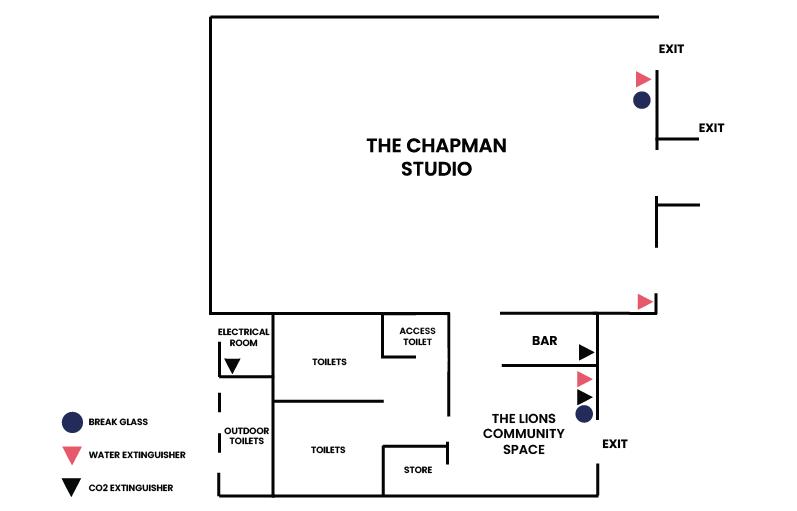
Fire Evacuation Plan - Reviewed April 2025
Performing Company (Evacuating to Bobby Ball Statue):
> Upon hearing the alarm or evacuation announcement: evacuate via the nearest exit
> Assemble at Bobby Ball Statue
> Await Stage Manager/Chaperone (where applicable) for roll call
Company Backstage (Evacuating to Bobby Ball Statue):
> When alarm sounds leave the building immediately and calmly through the nearest safe exit
> Roll Call to be conducted by Stage Manager/Chaperone where applicable.
DO NOT ATTEMPT TO RE-ENTER THE BUILDING UNTIL INSTRUCTED BY FIRE BRIGADE AND/OR FRONT OF HOUSE MANAGER/SENIOR MANAGEMENT.
Our Fire Marshals
If the alarm sounds and/or red light flashes, the Stage Manager will make an announcement.
> Open your Fire Door
> Put on your High Viz Jackets (if appropriate) and switch your torches on.
> Call “This Way Out Please” whilst gesturing towards your Fire Door.
> If your Fire Door is close to the fire, stand a safe distance away and call “That Way Out Please” whilst gesturing to the closest safe exit.
> Direct public to the Tennis Courts (general public)
> Close Fire Door from Outside if able
Our Foyer Staff/Volunteers:
> Assist with evacuation through the Foyer IF IT IS SAFE TO DO SO
> When the public have evacuated, please check toilets in the foyer
> When the public have exited, close your fire doors on your way out if able
> Muster at The Tennis Courts and await further instruction.
DO NOT LET ANYBODY BACK IN TO THE BUILDING UNTIL FRONT OF HOUSE MANAGER/SENIOR MANAGEMENT TELLS YOU THAT IT IS SAFE TO DO SO.
Pre-Arrival
Production Meeting – we require all User groups and hirers of the theatre to attend a production meeting with the Technical Manager no later than 1 month before the production start date. Please email technical@lowtherpavilion.co.uk
Technical Help – In the contract there is 1 (one) Venue Technician assigned to your production which is for insurance purposes and to oversee any issues during your time with us. Additional technicians are available and will need to be discussed on the production meeting.
Child Licensing - We require all child licenses (if applicable) to be emailed to us at the earliest convenience. We will not allow any performance to continue without this paperwork being sent to us. Please email it to administrator@lowtherpavilion.co.uk
Access and Call Times - When booking your time at The Lowther Pavilion you will be given call times in four hour blocks.
You MUST NOT access the building outside these times, this is for your safety as work may be taking place by technicians; this counts for both stage and backstage.
Prior to a performance you are allowed access to the building 90 minutes before curtain up.
Post show you must vacate the backstage area as soon as possible. If you access the building outside of your designated times you will be charged for additional time.
There is a camera pointed at the Stage Door and it logs everyone as they access the building.
Backstage will be handed over to your group in a clean/ready state at the start of the hire period.
We currently has 7 dressing rooms, and we have a maximum backstage capacity of 140 people at any one point.
For additional larger, dressing room space, The Chapman Studio may be available at the time of booking.
It is solely in the gift of the venue staff as to which dressing rooms are available at any one point as there maybe multiple events taking place during your hire period.
Venue Staff will always knock and wait for a response before entering a dressing room unless an emergency situation arises (for which the venue staff reserve the right to enter without due warning).
It may be necessary for dressing rooms to be locked even when only a single event is taking place in the venue.
Visiting Companies are responsible for chaperoning children at all times in all areas.
Personal items are also the responsibility of the visiting Company and are left at their own risk.
The electrical safety of equipment being used by visiting Companies is also their responsibility.
It is forbidden to smoke and/or consume alcohol in any space backstage.
All set pieces brought into the venue must not touch/be leant against any theatre fixtures or fitting.
Any damages caused or additional cleaning required to reinstate as found will be recharged.
We, and our staff or volunteers, cannot assume responsibility for any items of set/props/technical equipment brought into the space. It always remains the responsibility of the incoming hirer.
Dressing room bins (if full) need to be placed outside the door for collection.
Stage door access is strictly for those backstage and the pass door to the foyer area is out of bounds to incoming groups.
All areas outside of your assigned dressing room (including toilets) are considered open to all visiting companies and members of staff including volunteers.
Volunteers will carry lanyards to indicate their presence and will enter and exit via the stage door.
You do not have exclusive use of the backstage area regardless of which performance space your event is taking place in.
There are designated areas where props can be stored, these spaces are to be shared by users of all spaces. Storage of props outside of this area is strictly forbidden.
Shared spaces backstage must not to be used for costume changes by performers. These must take place in their dressing rooms with absolutely no exceptions.
All shared spaces backstage are covered by CCTV for everyone’s safety and security.
Backstage to be returned to as was found at the start of the hire period.
All Bins to be placed outside dressing room doors for collection. Additional cleaning charges will be levied if required as per our T&C’s. All set pieces must be removed from the theatre immediately after the last performance is completed. No storage/set items/technical equipment will be allowed to stay in the building unless prior arrangements have been made with the theatre technical staff.
Our venue is a multifunctional space and there may be simultaneous performances going on in other spaces during your hire.
As a multi space organisation, you should expect other users to be backstage during your get-in, performance or rehearsals.
Our spaces are broken down into:
The Main House
Located in our original building, this is our 450 seat or 900 standing space.
The Main House Bar
Previously known as The Studio, our Main House Bar can seat 80 people.
The Chapman Studio
Housed in The Windmill Performance & Edcuation Centre at the back of our building, this space has a capcity of 162 seated or 350 standing.
The Gardens
Much like our indoor spaces, our gardens are used for single performances and outdoor festivals.
For big outdoor events, such as our annual festival programme, we request parking on Lytham Green from Fylde Borough Council to alleviate parking issues whilst these large scale events are running.
If permission is given your customers will be informed where parking is available.
Please note: parking is not guarantteed.
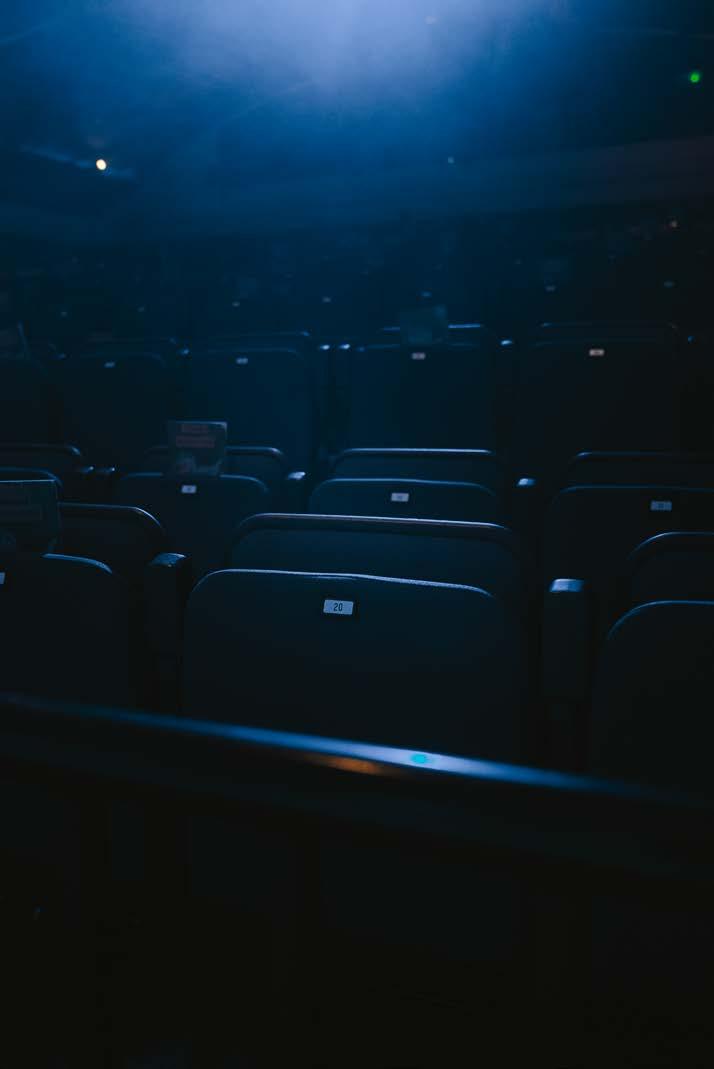
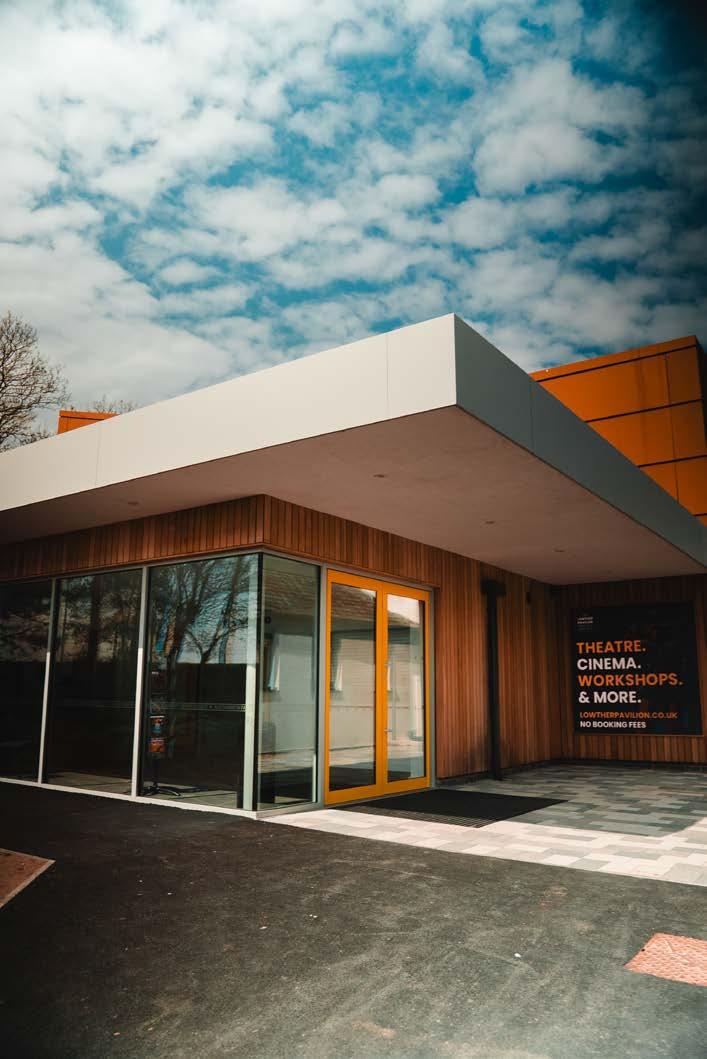
It’s easy to assume we have the same resources, and seemingly endless budgets of much bigger theatres across the country.
This isn’t the case, and we don’t set budgets or create campaigns for individual shows.
Despite how things have worked in the past, the role of marketing isn’t to sell tickets to individual shows, but instead to market the venue and as a destination with a diverse programme. This in turn gets people picking up our brochure or visiting our website where everything is on offer.
> Clear communication on what you hope to achieve from your show (this will help us make suggestions on what marketing activity is available to you)
> Digital assets that are the correct shape, size and of good quality. We are often being provided with portrait images for the website when we require 1080px x 1920px (landscape). By not providing this, the image looks very unprofessional on our website.
> When free training is provided by our Marketing Team, you do your best to attend.
> An understanding that audiences visiting the venue are not exclusively your audiences.
> An understanding that spaces such as the bar and foyer are not extensions of a performance.
> An understanding that we don’t get involved in group politics.
> An understanding that we don’t use AI generated imagery due to potential copyright issues.

When you book a show to perform, it is up to you to take the lead on marketing your show.
However, we do offer all shows a basic package of marketing which includes a website listing, inclusion in a payday newsletter (subject to availability) and a few other key bits of activity.
For the full list of activity you’ll receive, please visit our website lowtherpavilion.co.uk/marketing-resources
Alongside the free activity we provide for all shows, we’re also able to offer additional marketing activity to help you market your show.
This includes, but isn’t limited to:
> Full database emails via our Box Office system
> Segmented emails via our Box Office system
> Adverts in the local newspapers (Blackpool Gazette, Lytham St Annes Express, and Lancashire Evening Post)
> Full-page and half-page adverts in our what’s on brochures
The costings for these can be found on our website: lowtherpavilion.co.uk/marketing-resources

We aim to produce three brochures a year. The costs to advertise in these can vary depending on printing costs. The sizes we offer are below and more information can be found online at lowtherpavilion.co.uk/marketing-resources
• Full-page advert (print and digital) - £POA
• Half-page advert (print and digital) - £POA
• Quarter page advert (print and digital)- £POA
We can also organise and run META campaigns via our Facebook/META Business Suite account for you. Please let us know what your budget is and if you’d like for us to set this up.
Why is there a cost for certain marketing activity? The simple answer is time and cost to the organisation.
For example, if you want us to send an email out to our full database that exclusively advertises your show, this does come at a cost to us. Not only is there a service charge to us for doing so, it also takes time for us to build, proof and test the email before sending it out.
It’s also worth highlighting that some of the additional marketing activity we offer involves an external company such as flyer distribution. We don’t set the prices for these.
Print & collateral information
It is your responsibility to provide the print for your show.
Over recent months, we’ve updated the foyer area in our building to remove poster frames and replace them with digital screens. Not only does this mean we can advertise more shows at once, but it also cuts down on printing costs.
In terms of print, we ask for:
> 500x A5 flyers
> Up to 5x A1 posters
> 1x foursheet (60in x 40in, portrait, optional)
Please be aware that we have limited storage in the building. We will have to reject or recycle print that exceeds the numbers above.
Going forwards, poster space cannot be requested as there are too many shows that all want the same frame.
We currently employ a poster rotation system, which aims to change key poster sites on a monthly basis.
Banners, and or roller banners are not accepted in the building or gardens.
If you are bringing print for your show to the building, we ask that you don’t put it up yourself. When delivering, please leave posters and collateral at Box Office (Monday - Sunday, 10am - 4pm).
We work with two key distribution companies to distribute print across Lancashire:
> Northern Print Distribution
> A-Ha! Distribution
Over the course of the year we distribute around 40k brochures using these two companies.
We do not allow for set dressing or show related decorations to be on display around the building beyond the stage. Even if your show is happening over multiple days, the building needs to still function as an every day space, which includes continuing to market other upcoming shows and the overall venue offer.
It’s important for you to manage the expectations within your group. For example, if we previously did something to market your show, it doesn’t mean we can continue to do that. Things change and we’re always looking to make marketing as efficient as we can. This also can be applied to social media - we can’t just post about your show every few hours or on demand. Not only is this not good for longevity, but we risk being penalised by the social media channels.
Unless it comes from us directly, we ask that you don’t listen to false information.
Putting aside a marketing budget for your show is vital. It takes a lot to market a show, especially if you don’t have a big name or unique selling point.
A good way to work a marketing budget would be to decide on how many tickets you’re likely to sell, take percentage from each ticket and have that as the “marketing value” of each customer. For example, that could be a £2 marketing spend per ticket you want to sell.
We can’t stress enough the importance of a marketing budget. If feel like your show has to rely on big gestures (such as a 10-piece live band), you need to consider how that will sell your show and how you will market that information.
We’ve created a section on our website containing all the marketing information you need to know. Please refer to this section for all up-to-date versions of our logos, free branded footers for use on your poster and flyers (optional) and a guide written by us on ideas of how you can market your show.
Please visit: lowtherpavilion.co.uk/marketing-resources/
Currently, we employ two members of staff which make up the marketing team:
Anthony
Price Head of Marketing Steph Windross Marketing
Assistant
If you need to contact us, please email us at marketing@lowtherpavilion.co.uk

Our Technical Team are here to ensure you look and sound your best whilst visiting us and hiring our space. To enable us to support you in your production there are several processes that we need to go through in order we get all the relevant information from you and we can then share with you any ideas or thoughts you have on how to stage your production with us.
You will be allocated a Technical Coordinator for your production and we ask you to nominate a member of your company to be the conduit for all communication.
> JotForm will be issued to contracted email address for company.
> JotForm contains the following information required from the company
> Date Of Get In
> Contact Email (if different from contract)
> Theatre bar arrangements and costings
> Technical staffing
> Get out staffing
> Followspot requirement and whether you require our staffing for this
> Risers requirement
> PRS and the relevant forms to submit
> Running times of the show
> Special effects and their usage in the venue
The Technical Coordinator will arrange a production meeting via email no later than 4 weeks before the incoming show. Please email technical@lowtherpavilion.co.uk to arrange. We would prefer you have available your director and any creatives from the production so we are able to discuss all aspects of your production at one time.
The company’s nominated spokesperson and the Technical Coordinator will be the main contact in all matters relating to this production.
Production Meeting:
> Set Design/Details
> Sessions booked and confirmation of technical schedule for show
> Get in and out procedure
> Stage doors codes Issued
> Technical staffing requirements (lighting/sound design and/or operation). We can provide simple lighting & sound design within any package. Any further design requirements can be discussed at this time.
> Any shows or events that are being presented at the same time (internally/externally) by the venue. We are a 52 weeks year operation that has staged 480 performances in 2024/25. Please be aware that we may have other performances scheduled around your use of the venue.
> Expectation of technical staffing – i.e design needed for musical/sound effects required for plays
> Child licenses & relevant authority
Get In
You will be welcomed on the first day of your get in by the duty technician at the time of your first contracted session. Please note all access must be through the stage door due to fire risk assessments and Health and Safety protocols (body temp cameras/sign in sheets). You will then be handed a check sheet for the dressing rooms to sign off when they are released for you.
> Set Loaded in under supervision of the Venue Duty Technician
> For Health & Safety reasons we don’t allow any screwing into our floor or existing set pieces on stage
> No Gaffer or double sided tape on the floor due to previous damage caused by this (only electrical or low tack tape allowed)
> The Orchestra Pit Lift in The Main House or roller shutter in The Chapman Studio is only to be used and operated by the venue technical staff
> Please be aware that the auditorium will have been cleaned prior to your arrival therefore we kindly request that the theatre seating is not used by members of your cast.
> For health and safety reasons it is requested that all access to the foyer and café is from the stage door and not through the theatre auditorium. The theatre is a working space and until an audience are admitted there is movement of stock & operational items including the tallescope/gas bottles/bar deliveries/marketing material etc. Lighting levels can also be actively changed in the auditorium which would enhance any trip hazards present.
> A Venue Technician Coordinator will be on duty any time the stage you are hiring is used (including rehearsals)
> No access allowed to the Fly Floor/gantry or use of the theatres rigging systems
> Our normal show times are 2.30pm for a matinee and 7.30pm for an evening show. Any show that overruns past their contracted period are subject to an overrun charge
> Access to the dressings rooms and stage will be 1.5 hours prior to a performance start time
> If you require contact with or advice from any of the management team from the venue all communication must be through the Venue Technician Coordinator as a first port of call. An appointment time will be given to suit both parties if required
> All visiting company members need to sign in and out and use the stage door only as a means of entering and exiting the building due to our fire risk assessment and also heat cameras installed in the venue.
> No guests/visitors are allowed backstage without prior arrangement with the Technical Coordinator.
The Show:
> We will support the running of the show and provide all staffing required to facilitate performances.
> During the run of the show if your bin in the dressing room is full, please leave the full bin liner outside of your room overnight for us to collect and issue new bin liners for. If there is an issue with your dressing room please inform the technical coordinator.
> Please ensure that windows are closed and lights are switched off as you leave your dressing room as we cannot be held responsible for personal items and effects.
> Evacuation procedures are clearly marked on the rear of each dressing room door with the our fire and emergency policies. Please make sure you have read these and adhere to them for your own health and safety.
> In the unlikely event of an evacuation during a show the duty technician will coordinate with the visiting stage manager a safe exit from the building. Please note that visiting companies are responsible for their own signing in and out of all members in order that roll calls can be carried out.
> Any persons under the age of 16 in a performance will need to be properly licensed by the local authority. Licenses must be displayed clearly backstage. Licensed chaperones must make themselves known to the Duty Technician
Get Out :
> The get out will commence immediately after the last performance has taken place
> All items from the visiting company must leave the building at this time (Set/Costumes/Personal Items).
Please note: We have 24/7 CCTV cameras around the building for safety and security reasons. Please only use allocated dressing rooms when changing costumes.
> Dressing Rooms must be returned as found
> No blue tac or Sellotape to be used on walls or mirrors
> Dressing rooms must be vacated during the get out
Theatre Bar:
> Our bar will be open 45 minutes before a show/at the interval of a show and post show (via prior arrangement on the JotForm submission/production meeting) for either a free of charge (FOC) 30 minute after curtain down/1.5 hour or 2.5 hour slot (this is chargeable as per the JotForm submission)
> No Bar tabs are available – all sales must be paid for at time of order.
Technical:
> Technical/Bar recharges & costs – these costs can be found in the JotForm
> The sound systems in both The Main House and The Chapman Studio will be free of charge to Community Cultural Groups as long as our Sound Technician is operating the show. If an external operator is hired in by your company/group there will be a recharge.
> A charge will be levied if the get out exceeds 1.5 hours from curtain down (30 minute increments)
> For plays – 1 x Venue Technician will be present for the get out/for musicals & large scale shows. 2x Venue Technicians will be assigned for the duration of the get out
> Our aim is to allow you to perform using first rate facilities with the support of industry professionals allowing you to shine and get the very best out of your time here with us.
Remember you only have to ask if there is anything you don’t understand as we are here to help you achieve your goals.
Introduction
Marking up a script is possibly the most important part of making your show a success. Your tech is there to make your show as good as it can be.
A script that is marked up correctly will mean that a tech can do their job effectively.
Basics
First narrow down what the tech needs to know. A lighting tech doesn’t need to know when a mic is muted or unmuted. A Sound Tech does not need to know when a prop is moved.
People can become ill, your script should be so clear that another tech could operate the show without having seen it or the rehearsals.
Syntax and grammar are very important to following a Tech’s script. Tech’s need instructions to be in order of time.
When a tech is handed a script they often have an extremely limited amount of time to familiarise themselves with the content. Instructions need to be as clear, unambiguous and as direct as possible.
Think about how you would read and act in their position if you had no prior knowledge of the show.
Read the marked up script back to yourself, was it obvious when someone left the stage? Was it clear when someone needed muting for a quick change? Was it obvious to lighting when a scene was over? (when not called).
We understand that often a script provided by Samual French or Music Theatre International will be provided in books however, a typed up version using a word processing program could help to make things clearer.
A printed version makes it easier to read.
Try to make the script clear and place instructions in an obvious location that couldn’t be missed.
It is beneficial to use colour in your script to separate cues from dialogue or stage direction.
Eg:
SFX45 Midnight Clock Strike
Cinderella: “I’m sorry I must go”
1 OFF Exit Cinderella
Prince: “Wait, don’t go”
2 OFF Exit Prince
3 ON Enter Buttons
Buttons: “Cinder’s where are you?”
You should keep the colour the same for each discipline for clarity; where a single Tech is operating more than one piece of tech (eg. Sound and Projector) then using two different colours will make it easier for them to differentiate instructions.
Eg:
SFX60 Ghostly Unscore
Projection 2
LX56
Sound
Your Sound Tech is NOT watching your show, they’re listening and reading a script. Ways to help your Tech might include making the entrances of characters obvious. For example, if you are using an MD and band, you could have them start the next song and then have the performers enter.
Remember your Sound Tech is not on comms and so they have no one telling them what is happening outside of the script. The script is their only way to know what will be happening.
You need to have ALL dialogue and sung parts in the script, especially if your performers leave the stage, or enter it, during the song.
Just putting a song title in to the script won’t help the Tech understand what
is actually happening; remember they have not seen the show before you enter the building and might only have one rehearsal, or none, to understand what is happening.
Make it obvious who specifically is singing or talking. It is not helpful to just label a group.
For example you may have two sets of chorus (example Male Chorus and Female Chorus) or a chorus where one character is killed off at one point.
Examples:
Munchkins ON
6,7,8,9 ON
This example is not helpful, especially if one isn’t on for that scene
This is extremely helpful as it precise
Avoid having excessive sets of radio mics live where possible. A performer should only have their mic unmuted if it needs to be. More unmuted mics means more noise and less clarity in your show’s sound.
Lastly, if a visual cue must be used for sound then you should make it as easy as possible for sound to know when this will happen, an example might be to make sure the performer is visually on stage before they speak.
Sound Techs do not need to know the character’s names and quite often sound desks won’t allow the space to type a name. Therefore it is correct to use the mic list and a number for the script.
Eg:
Roxy ON, Velma ON, Billy ON
1, 2, 3 ON
This is lengthy and requires time to interpret and locate.
This is concise, quick to read and easy for a tech to locate on a desk.
Also note that ON stands out much better than on.
Lighting is arguably one of the most important aspects about the production.
It sets the mood/tone and emotion of the piece of theatre that everyone is witnessing on stage.
We aim to make your show the best It possibly can be whereby we have invested quite heavily in a fully adaptable LED lighting rig which has enough in the roof to satisfy even a West End show!
A marked out script for the technician is where we start.
This piece of information is the most important as it is what forms our “bible” so to speak and where we get everything we need to program and light a show.
Any actions/stage directions/moods/timings/settings and time of day all matter when it comes to lighting a show.
We can be as basic as putting a warm wash on stage right through to narrowly focusing on an actor delivering a monologue to set emotion.
All is achievable down to the smallest of cue changes to allow for subtleties to enhance the performance.
What we need to convey is the time that larger shows take to program and design.
Our professional incoming shows either usually tour with their own lighting technician who knows the show and has it already plotted on their own console or they ask the venue technician to “busk” the show. This means we are given a cheat sheet and told to go live at 7.30pm and act according to what we see on stage as it happens.
This in a one night setting is acceptable but for a run of shows we always need to “cue stack” the show.
Cue stacking is the process in which the director and creative team will sit with one of our technicians to program the lighting into our console in order that a “go” button is pushed and the lights change to programmed states which do not alter each night.
This process is the section that, similarly to sound, takes the time to work out and plot.
We start this process by writing cue numbers into a script which forms the basis of the “book” in which the stage manager calls out to the standbys and go’s each night to the lighting technician on the console.
This is the most critical and often overlooked process in making your show look great.
We’ve all seen a show where the actors are too dark or don’t hit their spot on stage – this process takes the most time to ensure every position is marked on stage where actors need to be at what time and also it is possibly the first time that the lighting technician has seen anything to do with the production.
Anything is achievable as we develop more technology in lighting terms.
We have taken a huge leap forward in our standard lighting rig and it is now adaptable to 99% of all incoming and touring shows we host here.
This saves you, the hirer, time in having to ask the technician to “rig” the lighting before it is plotted as most of our lighting is moving heads so all positions are achieved from the console rather than a pair of ladders.
If advanced Lighting Design is required there is a cost to this which we can discuss at the production meeting stage.
Our sound systems Main House system is a professional, industry-leading PA system. The basic purpose of a PA system is that it is designed to provide a more consistent sound across the whole auditorium.
If you sit in row AA or R you should hear almost the same sound.
We have, as standard, a 32 channel sound mixer.
32 channels is the absolute limit that this desk can handle. What this basically means is that you can have 32 channels for your show and no more going in to the desk. Each instrument that needs amplification will require a minimum of one channel but some will require more.
Think about what you actually NEED to be amplified, the more you need mic’d the less other things can be processed and mixed. So, consider what would be a standard band for a musical show and what it would require in terms of channels.
The biggest user of channels will almost always be the drums or percussion; this is because they have the highest number of things that require amplification.
Here is a sample channel list that might bare some similarity to your own show:
1. Kick Drum
2. Snare Drum
3. Hi Hat
4. Rack Tom 1
5. Rack Tom 2
6. Floor Tom
7. Drum Overhead
Left
8. Drum Overhead
Right
9. Bass Guitar
10. Upright Bass
11. Electric Guitar
12. Acoustic Guitar
13. Keyboard 1 L
14. Keyboard 1 R
15. Keyboard 2 L
16. Keyboard 2 R
17. Brass 1
18. Brass 2
19. Woodwind 1
20. Woodwind 2
This isn’t how all bands work, some use more channels, some less, but this is a good example of what we normally would be dealing with.
Now that we’ve covered the band we have 12 channels left on the desk.
That’s 12 channels that could be used for radio microphones or other microphones.
Whilst you could do something we call “submix”, this requires another sound tech to do successfully or well.
It compromises your end product that the audience hears.
Submixing is difficult and full of compromises that will negatively effect how your show sounds and could even lead to major mistakes, such as something being missed whilst the sound tech is focusing on the second desk.
Submixing should be avoided at all costs.
Hiring in radio microphones can be expensive. Each radio pack can incur cost, each pack could suffer damage that has to be paid for and each pack will use batteries which will also add to the cost.
The more microphones you use the busier your technician will be, which can lead to more mistakes. Remember the technician may have only seen your show a couple of times prior to opening night.
This section may be a little too in depth but it is important to understand.
Ofcom enforce radio communications in the UK, this includes radio microphones.
There are two frequency ranges that Ofcom allows for use in UK entertainment environments:
> Channel 38 (606.500-613.500mhz)
> Channel 70 (863.000-865.000mhz)
Any radio microphones you use outside of these ranges are NOT licensed, covered, supported, permitted, allowed by either ourselves or Ofcom.
We hold a license, as a venue, for Channel 38 (anyone can buy a license and use this range) and Channel 70 is unlicensed (anyone can use it without purchasing a license and our drive in cinema system is on this range).
These channels provide a limited range for radio mics.
Channel 38 can support roughly 12 radio mics without interference. Any more and you can purchase a one off license from Ofcom for channel 39 or 40.
This is your responsibility as the visiting company.
If you want more than 12 microphones on your cast, unless you use Channel 70 as well, you need to obtain a license to use them in our building.
Consider your technician. They have sat through potentially just one rehearsal before your show opens, they might have a script in front of them but they might be dealing with multiple entrances and exits of cast at the same time.
Your technician also can’t see into the wings. They might not know your line is delivered off stage. Try to limit lines to when the technician knows the performer is on stage.
Your sound tech isn’t watching the show, they’re listening and reading.
You should produce an accurate script with entrances and exits marked up correctly for each performer who is mic’d up. For simplicity your cast with mics should be assigned a number as these are easier to read next to a script. This is a visiting company responsibility as we potentially do not know your show before it arrives at our door.
When booking your call times consider how you plan to use your time. For example, if you book two separate four hour calls you will spend both sessions waiting on people to arrive, dress, sound check, makeup, fit mics etc. If, however, you book two four hour calls together you could use your time more efficiently.
Remember when bands are used they need time to set up, sound check, deal with monitors, rehearse etc.
When you use a band you need to factor in their call time.
If you book a four hour call and have the band turn up at the beginning of that call they probably won’t be ready for the first hour of that session, leaving you with only three hours of that call left for rehearsal; if your show is two hours long and you’re doing blocking this time will disappear quickly.
Plan how you use your time, even if you end up not being able to stick to it. That way everyone involved will have a rough idea of what should be happening and when.
If things slip it’s less of a problem than if no one knows what’s happening.
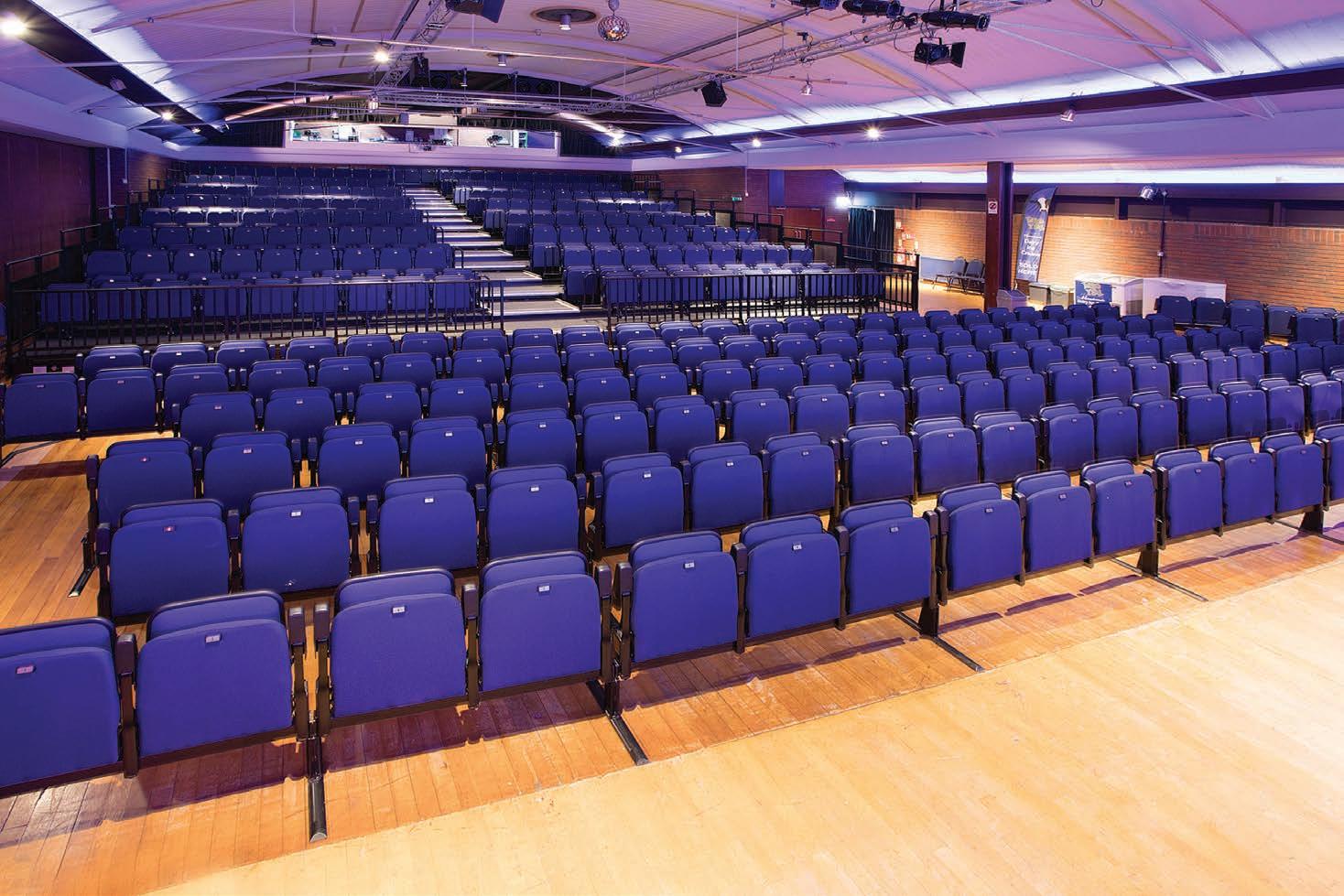
Front of House operations for all shows are under the direction of our Duty Manager team. They are responsible for overseeing all FOH operations for each performance.
Companies should nominate a representative responsible for liaison with the Duty Manager (DM). That representative should introduce themselves to the DM pre-show (bearing in mind that there is likely to be a different DM on duty when multiple performances are scheduled).
Programmes and/or mechanise to be sold in designated are as agreed by venue staff.
No tables, stands, free-standing signs etc. are to be erected in the foyers due to Health and Safety reasons and the need to keep the spaces clear for the safe passage of staff and audience members.
The Duty Manager/Venue staff have overall discretion regarding show start and re-start times and will notify technical and visiting staff accordingly.
Duty Managers are extremely proficient and experienced in their handling of any Front or House issues arising both pre, during and post-show. They will provide assistance and support and should be the point of contact for any Front of House matters arising.
We offer free and charged workshops throughout the year aimed at developing your cultural groups skills. These workshops are always led by industry professionals and address issues that groups have when working in the theatre. The take up previously for these workshops has been poor from local cultural groups and we would like to encourage everybody to try and develop their skills so that they can be more accomplished when performing on our stage.
Workshops offered include:
Voice and projection
> Controlled Breathing from your diaphragm
> Diction
> Pitch and projection
> Power in your voice
> Warm up exercises
> Resonance
> Exercises to help you develop at home.
We feel it is important that there is interest backstage as well as on stage. For those who may prefer to be around the stage but not on it our technical training program is something we offer to all from 14+ to learn all about Lighting/Sound and Stage Management from our industry professionals each week.

Marketing your show, including:
> Free resources you can use to help market your show
> The basics of marketing including target audiences and campaign planning
> Design 101: tips for designing eye-catching print or digital assets
As well as running technical, marketing and voice workshops, our Lowther Creatives strand also has adult (18+) and Young Peoples’ groups (4 - 18 year old) workshops, which can look at:
> Building confidence, developing communication, collaboration and teamwork.
> Learning stagecraft: voice work, physical characterisation, staging.
> Creating original work: improvisation, devising and scripting ideas.
> Reading, analysing and performing text.
> Outdoor and site-specific performance.
> Arts Award qualifications, for children and young people.
> National Theatre Connections – a UK wide festival for young people, involving Directors’ training in London at National Theatre; main stage performances at regional partner venues such as Blackpool Grand.
> Projects in the school holidays: Film School, theatre projects, family workshops and Arts Award sessions for specific skills such as puppetry, music, story, etc.
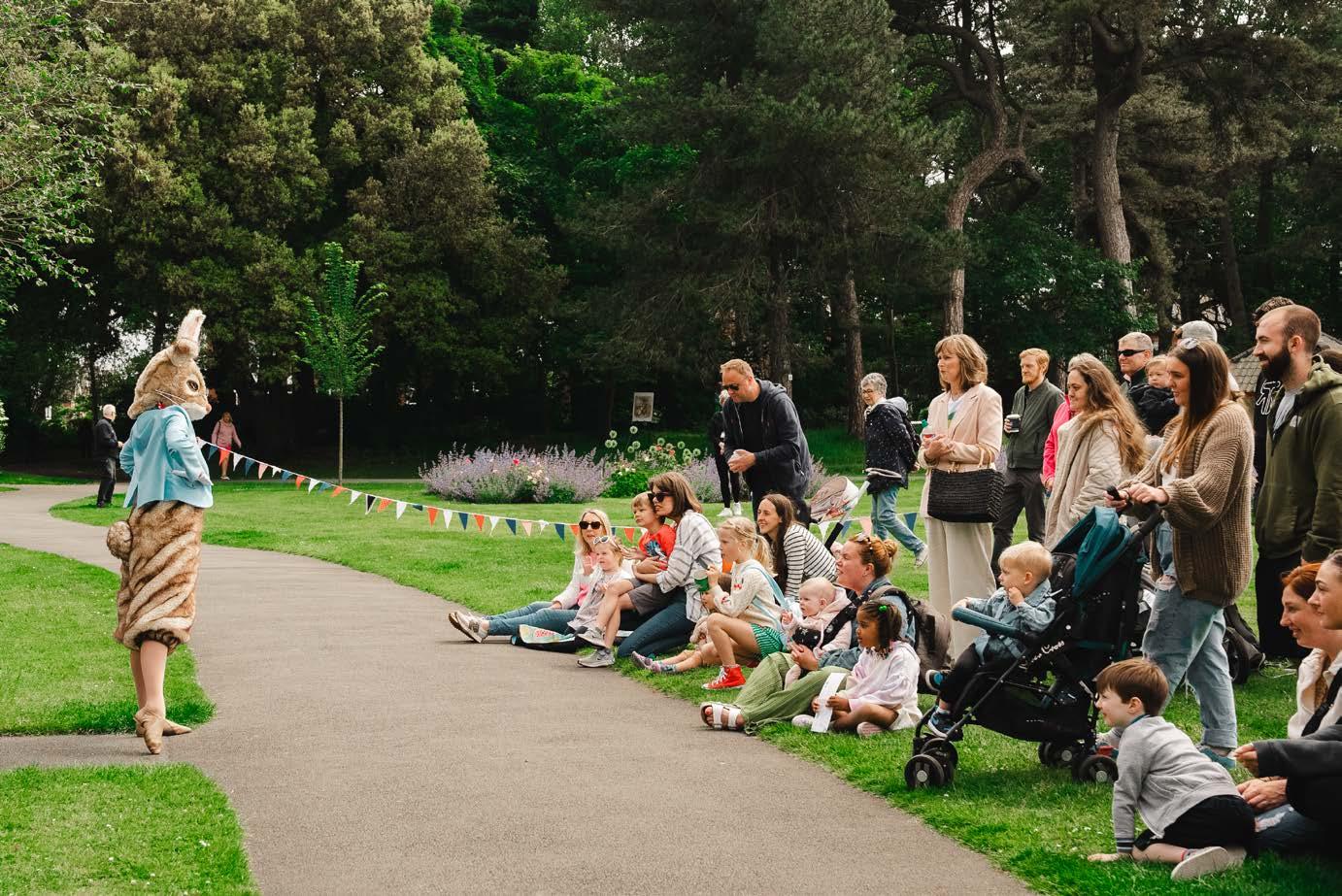
by
The Financial Settlement will be issued 7 days after your final performance & will include your ticket sales income less the following charges:
Ticket Levy Donation will be added to the price of your ticket to cover the theatre’s maintenance & redevelopment costs
Box Office Commission is the charge for selling your tickets & covers Box Office staffing, Box Office ticketing system software costs, setting up of your show on our website & on our ticketing system software as well as your show listing in our What’s On Brochure.
Card Charges is the charge to cover the cost of card merchant fees.
Performing Rights Society (PRS) is the charge as outlined in the PRS Section of this booklet.
Marketing Charges are the charges agreed with our marketing department and yourselves.
Technical Charges are the charges agreed with our technical department and yourselves.
Once agreed & signed by your representative, payment will be transferred to your nominated account within 7 days of the return of this document.
Our Senior Management Team will meet with you and other Community Cultural Groups in an open format meeting twice a year.
Please keep an eye on your emails as we’ll get in touch to announce the dates of these meetings.
As a venue and organisation, we are going from strength to strength and will shortly be able to offer Community Cultural Groups the choice of four spaces in which to work. This past summer saw community groups explore working in the gardens as well as some performing in The Tent.
The Windmill Performance & Education Centre, which opened in April 2025, presents User Groups with new creative opportunities in a new environment.
Last year, over 480+ performances took to our stage with local user groups making up 167 of these.
Our team will continue to work with local cultural groups treating them as they would any professional organisation.
In writing this user manual we hope it demystifies some of the rules attached to using our venue and we look forward to working with you all on your cultural productions.
Please remember everything is possible. The only limiting factors on creativity are imagination, time to rehearse and budget.
There should always be a reasonable expectation of what can be afforded within the time frame that you have booked in the venue.
I look forward to welcoming you.
Tim Lince CEO/Artistic Director
Tim Lince CEO/Artistic Director tim@lowtherpavilion.co.uk
Colin Alexander Administrator administrator@lowtherpavilion.co.uk
Dan Creasey Technical Manager technical@lowtherpavilion.co.uk
Simon Miller Venue Technician simon@lowtherpavilion.co.uk
Janet Morgan Volunteer Co-ordinator volunteer@lowtherpavilion.co.uk
Kerry Tuhill Education Officer youtheatre@lowtherpavilion.co.uk
Keith Robinson Finance Manager accounts@lowtherpavilion.co.uk
Adam Pearce Bar & Events Manager bar@lowtherpavilion.co.uk
Anthony Price Head of Marketing marketing@lowtherpavilion.co.uk
Steph Windross Marketing Assistant marketing@lowtherpavilion.co.uk
boxoffice@lowtherpavilion.co.uk 01253 794221
West Beach, Lytham St Annes, FY8 5QQ
Updated Monday 19 2025
Information correct at the time of writing, and maybe subject to change.
